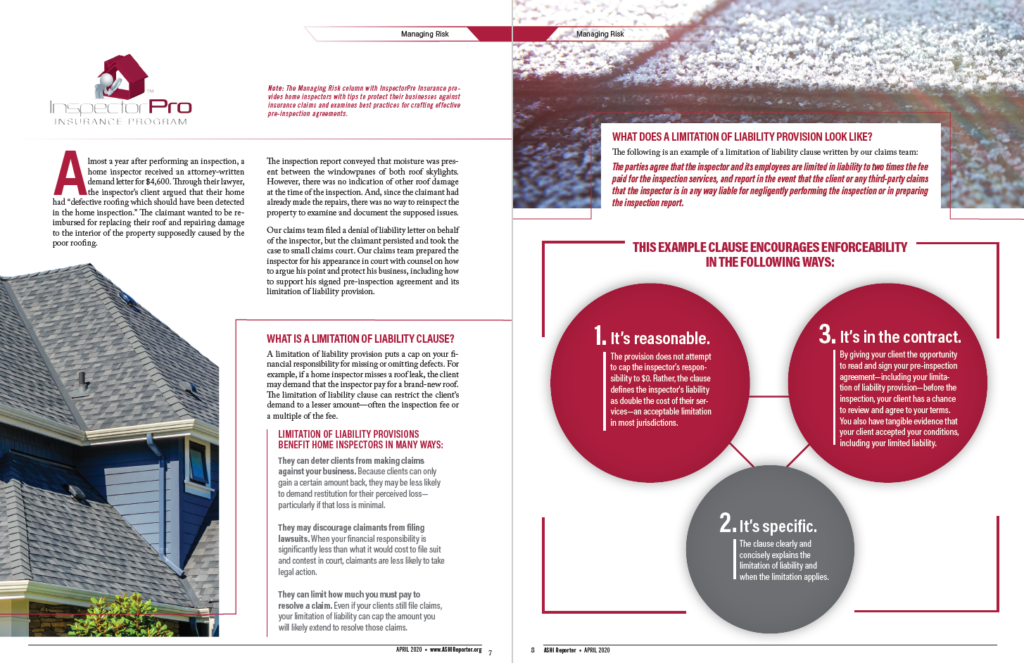Your Pre-Inspection Agreement: Limitation of Liability
Last Updated November 9, 2023

Almost a year after performing the inspection in question, a home inspector received an attorney demand letter for $4,600. Through their lawyer, the inspector’s client argued that their home had “defective roofing which should have been detected in the home inspection.” The claimant wanted to be reimbursed for replacing their roof and repairing damage to the interior of the property supposedly caused by the poor roofing—issues directed at the pre-inspection agreement's limitation of liability clause and the inspection report.
The inspection report did convey that moisture was present between the windowpanes of both roof skylights. However, there was no indication of other roof damage at the time of the inspection. And, since the claimant had already made the repairs, there was no way to reinspect the property to examine and document the supposed issues.
Our claims team filed a denial of liability letter on behalf of the inspector, but the claimant persisted and took the case to small claims court. Our claims team prepared the inspector for his appearance in court with counsel on how to argue his point and protect his business, including how to support his signed pre-inspection agreement and its limitation of liability provision.
What is a limitation of liability clause?
A limitation of liability provision puts a cap on your financial responsibility for missing or omitting defects. For example, if a home inspector misses a roof leak, the client may demand that the inspector pay for a brand-new roof. The limitation of liability clause can restrict the client’s demand to a lesser amount—often the inspection fee or a multiple of the fee.
Limitation of liability provisions benefit home inspectors in many ways:
- They can deter clients from making claims against your business. Because clients can only gain a certain amount back, they may be less likely to demand restitution for their perceived loss—particularly if that loss is minimal.
- They may discourage claimants from filing lawsuits. When your financial responsibility is significantly less than what it would cost to file suit and contest in court, claimants are less likely to take legal action.
- They can limit how much you must pay to resolve a claim. Even if your clients still file claims, your limitation of liability can cap the amount you will likely extend to resolve those claims.
What does a limitation of liability provision look like?
The following is an example of a limitation of liability clause written by our claims team:
The parties agree that the inspector and its employees are limited in liability to two (2x) time the fee paid for the inspection services and report in the event that the client or any third party claims that the inspector is in any way liable for negligently performing the inspection or in preparing the inspection report.
The example above encourages enforceability in the following ways:
- It’s reasonable. The provision does not attempt to cap the inspector’s responsibility to $0. Rather, the clause defines the inspector’s liability as double the cost of their services—an acceptable limitation in most jurisdictions.
- It’s specific. The clause clearly and concisely explains the limitation of liability and when the limitation applies.
- It’s in the contract. By giving your client the opportunity to read and sign your pre-inspection agreement—including your limitation of liability provision—before the inspection, your client has a chance to review and agree to your terms. You also have tangible evidence that your client accepted your conditions, including your limited liability.
How can you write a limitation of liability clause for your pre-inspection agreement?
A limitation of liability provision is enforceable unless:
- a court deems the clause unreasonable,
- an existing public policy negates the clause, or
- a court finds a home inspector grossly negligent.
When considering the first two restrictions, it’s important to have local legal counsel assist you in crafting your pre-inspection agreement. Legal assistance can help you cater your limitation of liability provisions to whatever regulations exist in your area. They can also help you avoid incorporating a limitation of liability clause in locations where such clauses aren’t permissible.

For example, Alaska, California, Connecticut, Massachusetts, New Jersey, New Mexico, Rhode Island, West Virginia, and Wisconsin all have statutes or Supreme Court rulings that potentially restrict or prohibit limitation of liability provisions. Some of these states allow limitation of liability clauses so long as they reduce inspectors’ financial responsibility to no less than a certain multiple of the inspection fee. Additionally, attempting to enforce a limitation of liability provision in some states could result in your license being revoked.
In states that restrict or prohibit these provisions, we recommend only including one if it satisfies mandates of your jurisdiction. Additionally, we suggest discussing how you might incorporate dispute resolution and arbitration provisions into your agreement with your attorney.
Manage your risk against potential claims.
Remember the home inspector at the beginning of this article? The inspector appeared in small claims court and the judge agreed with the claimant’s argument. However, the judge also ruled that the inspector’s limitation of liability should hold. The court had the inspector refund the claimant’s $300 inspection fee, closing the claim for 6.5 percent the initial demand.
Mitigate potential claims and cap your financial responsibility to claimants by incorporating a limitation of liability provision, where permissible. And have rest of your pre-inspection agreement signed before every inspection.
But don’t stop there. While limitation of liability provisions are great risk management tools, they are not silver bullets. Clients can sue and win settlements that far exceed the dollar amount specified in your contract. That’s why it’s important to carry errors and omissions (E&O) and general liability (GL) insurance for indemnity and defense against claims. Make sure you carry the proper insurance coverage to protect your home inspection business.
If you buy insurance with us, you'll get great coverage and access to our state-specific pre-inspection agreements, including their limitation of liability provisions. Learn more here.
This article was published in the ASHI Reporter in April 2020. See how this story appears in print below.







